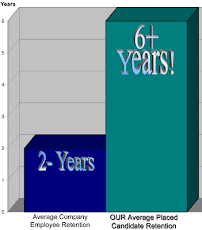Thursday
To the Hiring Manager: Tips for Acing the Job Interview:
It's not always a candidate's fault when a job interview goes south.
Hiring managers can commit a litany of sins, such as interrupting interviews to answer phone calls, failing to take notes, acting bored or distracted, bad-mouthing their own companies, bullying applicants, or asking "gotcha" questions for no reason at all, say human-resources consultants. The cost of poor interviews ranges from bad hires to alienated job applicants. At worst, untrained hiring managers can open their employers to lawsuits by asking questions deemed illegal by federal nondiscrimination standards.
Don't Ask
Many common interview questions reveal little about a job candidate. Here are some questions managers shouldn't ask and the alternatives:
AVOID: "Where do you see yourself in five years?"
Hiring managers ask this question to probe a candidate's career goals, but nobody really knows where they'll be in five years, said interview coach Pamela Skilling.
ASK INSTEAD: "How would this position fit into your long-term career plan?"
This is more likely to get the candidate talking about her goals, and why the job would be a great next step.
AVOID: What kind of people do you have trouble working with?
No one answers this question honestly. It also leads candidates to talk about "kinds of people" instead of their own interpersonal skills.
ASK INSTEAD: "Tell me about a time you had a conflict with someone at work."
Real examples show more clearly how a candidate works with different personalities.
AVOID: "Tell me more about your current position."
This is likely to yield a regurgitation of résumé bullet points.
ASK INSTEAD: "Walk me through a typical day in your current role"
A candidate's day-to-day responsibilities can elicit telling details.
AVOID: "Do you have kids?"
This is not only a weak question, but an illegal one.
ASK INSTEAD: "Would you be able to work the hours required for this position?"
Keep questions focused on the candidate's ability to do the job.
Source: Skillful Communications
interviewing is a job skill in its own right.
Most managers "wing it," said Ms. Skillings, and incorrectly assume they can simply follow their instincts to the right hire. That can mean that one candidate gets a thorough interview, while another gets a shorter sit-down if the boss is in a bad mood or busy, she added.
Such inconsistency may lead to unintentionally biased hiring decisions, said Lauren Rivera, an assistant professor at Northwestern University's Kellogg School of Management. Her research has found that interviewers gravitate toward people like themselves, who share their educational backgrounds or interests. "That's a natural human thing, but firms need to counterbalance that" by requiring a set of prepared questions and a consistent means of scoring and evaluating each applicant, she says.
Researchers from Harvard Business School found that the worst interviewers—those who let their own insecurities or unconscious biases drive the process, for instance—can have a worse effect on hiring decisions than if a candidate were simply chosen at random.
After seeing too many candidates decline job offers, iD Tech Camps wanted its regional managers, who each hire more than 80 seasonal camp directors and staff annually, to probe more deeply into applicants' abilities and interest level.
Through role-playing exercises in which the "applicant" had a hidden agenda—viewing the job as backup in case plans to move to Paris fell through, for example—participants worked on "not letting candidates get away with vague, generic responses," said Joy Meserve, vice president of camp operations.
Now managers ask all candidates if they're interviewing at other companies and whether they would accept an offer if one is extended. "We want people to be absolutely committed," says Ms. Meserve.
Since the training, Jen Devine, a regional manager based in Weymouth, Mass., said she no longer assumes a candidate is the right fit just because of the relevant experience on their résumés, and she stops herself before giving candidates too many clues about what she wants to hear. For instance, when asking for an example of how a candidate once taught a skill to another person, she refrains from offering anecdotes from her own life.
Ms. Meserve said camp directors' and instructors' evaluations of their teams for this year were the strongest she has seen since the company's founding 13 years ago.
At Philips, managers can take "Interview Process" classes to practice coaxing useful answers from applicants. In the program starting up next month, the company's human-resources staff will help managers make interviews more pleasant and efficient on both sides of the table.
That means more pre-interview preparation, no trick questions, and reducing the number of times a candidate "goes through the wringer," said Russell Schramm, head of talent acquisition for Philips's North America operations.
"We've heard about candidates interviewing with 20 people over three days. That's absolutely absurd" from the applicant's point of view and unnecessary for making hiring decisions, said Mr. Schramm, who added that Philips found itself losing qualified candidates who got fed up with the company's hiring process.
Troubling patterns of employee turnover and workers' compensation claims led J.S. West human-resources manager Brandi Fuller to spend $12,000 on an interviewing coach.
During a training session for the company's 20 managers last month, the coach warned against questions relating to sensitive areas such as a candidate's age or personal circumstances, which are illegal to ask. Managers seemed surprised, a reaction that had Ms. Fuller "cringing...I thought we'd made all of that clear before."
Most interview coaches also target listening skills.
Bosses must do some talking to give job candidates a sense of the company's culture, says Manny Avramidis, head of global human resources at the American Management Association, a professional-development group. But beware managers who talk too much. The candidate should get 80% of the airtime, says Mr. Avramidis. Otherwise, "it's a commercial, not an interview."
The same qualities that make people good interviewers also help them shine in the other parts of their jobs—evaluating information in a thorough and impartial way, for example, and being a good listener.
But these skills don't always come naturally. "It may sound odd, but active listening takes practice," says Ms. Skillings of Skillful Communications.
Write to Lauren Weber at lauren.weber@wsj.com
It's not always a candidate's fault when a job interview goes south.
Hiring managers can commit a litany of sins, such as interrupting interviews to answer phone calls, failing to take notes, acting bored or distracted, bad-mouthing their own companies, bullying applicants, or asking "gotcha" questions for no reason at all, say human-resources consultants. The cost of poor interviews ranges from bad hires to alienated job applicants. At worst, untrained hiring managers can open their employers to lawsuits by asking questions deemed illegal by federal nondiscrimination standards.
Don't Ask
Many common interview questions reveal little about a job candidate. Here are some questions managers shouldn't ask and the alternatives:
AVOID: "Where do you see yourself in five years?"
Hiring managers ask this question to probe a candidate's career goals, but nobody really knows where they'll be in five years, said interview coach Pamela Skilling.
ASK INSTEAD: "How would this position fit into your long-term career plan?"
This is more likely to get the candidate talking about her goals, and why the job would be a great next step.
AVOID: What kind of people do you have trouble working with?
No one answers this question honestly. It also leads candidates to talk about "kinds of people" instead of their own interpersonal skills.
ASK INSTEAD: "Tell me about a time you had a conflict with someone at work."
Real examples show more clearly how a candidate works with different personalities.
AVOID: "Tell me more about your current position."
This is likely to yield a regurgitation of résumé bullet points.
ASK INSTEAD: "Walk me through a typical day in your current role"
A candidate's day-to-day responsibilities can elicit telling details.
AVOID: "Do you have kids?"
This is not only a weak question, but an illegal one.
ASK INSTEAD: "Would you be able to work the hours required for this position?"
Keep questions focused on the candidate's ability to do the job.
Source: Skillful Communications
interviewing is a job skill in its own right.
Most managers "wing it," said Ms. Skillings, and incorrectly assume they can simply follow their instincts to the right hire. That can mean that one candidate gets a thorough interview, while another gets a shorter sit-down if the boss is in a bad mood or busy, she added.
Such inconsistency may lead to unintentionally biased hiring decisions, said Lauren Rivera, an assistant professor at Northwestern University's Kellogg School of Management. Her research has found that interviewers gravitate toward people like themselves, who share their educational backgrounds or interests. "That's a natural human thing, but firms need to counterbalance that" by requiring a set of prepared questions and a consistent means of scoring and evaluating each applicant, she says.
Researchers from Harvard Business School found that the worst interviewers—those who let their own insecurities or unconscious biases drive the process, for instance—can have a worse effect on hiring decisions than if a candidate were simply chosen at random.
After seeing too many candidates decline job offers, iD Tech Camps wanted its regional managers, who each hire more than 80 seasonal camp directors and staff annually, to probe more deeply into applicants' abilities and interest level.
Through role-playing exercises in which the "applicant" had a hidden agenda—viewing the job as backup in case plans to move to Paris fell through, for example—participants worked on "not letting candidates get away with vague, generic responses," said Joy Meserve, vice president of camp operations.
Now managers ask all candidates if they're interviewing at other companies and whether they would accept an offer if one is extended. "We want people to be absolutely committed," says Ms. Meserve.
Since the training, Jen Devine, a regional manager based in Weymouth, Mass., said she no longer assumes a candidate is the right fit just because of the relevant experience on their résumés, and she stops herself before giving candidates too many clues about what she wants to hear. For instance, when asking for an example of how a candidate once taught a skill to another person, she refrains from offering anecdotes from her own life.
Ms. Meserve said camp directors' and instructors' evaluations of their teams for this year were the strongest she has seen since the company's founding 13 years ago.
At Philips, managers can take "Interview Process" classes to practice coaxing useful answers from applicants. In the program starting up next month, the company's human-resources staff will help managers make interviews more pleasant and efficient on both sides of the table.
That means more pre-interview preparation, no trick questions, and reducing the number of times a candidate "goes through the wringer," said Russell Schramm, head of talent acquisition for Philips's North America operations.
"We've heard about candidates interviewing with 20 people over three days. That's absolutely absurd" from the applicant's point of view and unnecessary for making hiring decisions, said Mr. Schramm, who added that Philips found itself losing qualified candidates who got fed up with the company's hiring process.
Troubling patterns of employee turnover and workers' compensation claims led J.S. West human-resources manager Brandi Fuller to spend $12,000 on an interviewing coach.
During a training session for the company's 20 managers last month, the coach warned against questions relating to sensitive areas such as a candidate's age or personal circumstances, which are illegal to ask. Managers seemed surprised, a reaction that had Ms. Fuller "cringing...I thought we'd made all of that clear before."
Most interview coaches also target listening skills.
Bosses must do some talking to give job candidates a sense of the company's culture, says Manny Avramidis, head of global human resources at the American Management Association, a professional-development group. But beware managers who talk too much. The candidate should get 80% of the airtime, says Mr. Avramidis. Otherwise, "it's a commercial, not an interview."
The same qualities that make people good interviewers also help them shine in the other parts of their jobs—evaluating information in a thorough and impartial way, for example, and being a good listener.
But these skills don't always come naturally. "It may sound odd, but active listening takes practice," says Ms. Skillings of Skillful Communications.
Write to Lauren Weber at lauren.weber@wsj.com
Subscribe to:
Post Comments (Atom)














No comments:
Post a Comment